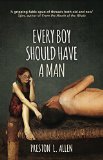Five words from the blurb: man, pet, bond, wild, dystopian
Every Boy Should Have a Man is a strange fable set at a time when the Earth is suffering from climate change. ‘Man’ is in danger of extinction – partly from lack of habitat, but also because giant ‘Oafs’ are keeping them as pets and eating them.
The book begins with a poor oaf child discovering a female man in a bramble patch. He takes her home to play with and discovers that she is a rare, valuable, talking man. The pair form a close bond, but their happiness is broken when she becomes pregnant:
If she were not pregnant, I would sell her as meat and pay for this expensive house I am building. And when the litter is born, can I sell it to make back some of my money? No. Instead I must surrender the litter to the wealthy! I could save a lot of money by just allowing them to remove her thumbs. I would surely be better off if I lived as a pet. The government protects pets! What about protecting people?
This is a very strange book, but its messages on climate change, slavery and animal ownership are delivered in an effective way. It shouldn’t make any difference, but seeing what life would be like if humans were kept as pets raised some difficult questions. The arguments were extremely powerful and some people might find them too disturbing, but I loved the way it made me stop and think about our treatment of animals.
Every Boy Should Have a Man is a short book. Part of me wants to criticise the fact that it skipped over elements I’d have liked to investigate in more depth, but another was impressed by the amount of subjects covered in such a short time. This probably means it struck exactly the right balance between the two!
The book successfully combined a variety of different myths; giving a modern twist to some old stories and creating new ones which were equally engaging. I loved the fact I had no idea what would happen next and would enjoy talking about some of the issues raised. It would make a fantastic book club choice, but I’d recommend it to anyone looking for something a bit different.





